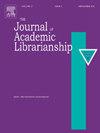北美主要大学图书馆中以数据为中心的角色研究
IF 2.3
3区 管理学
Q2 INFORMATION SCIENCE & LIBRARY SCIENCE
引用次数: 0
摘要
在过去的十年中,学术图书馆已经发展到支持不同的数据需求,从而产生了对专门的以数据为中心的角色的需求。北美学术图书馆由于其强大的研究基础设施和广泛的行政支持,被广泛认为是发展数据服务的全球基准。本研究考察了美国大学协会(AAU)主要成员的图书馆如何员工和构建这些以数据为中心的角色。使用目录审查、特定站点搜索、统计和文本分析的综合方法,该研究确定了2024-2025学年开始时71个AAU图书馆中321个以数据为中心的角色,平均占每个图书馆总员工的2.30%。虽然通才型数据馆员的角色占主导地位,但专业职位,包括非图书馆员人员也在前端数据服务中发挥重要作用。结果显示,公立和私立AAU图书馆在数据导向角色的流行程度或百分比方面没有统计学上的显著差异,这表明在塑造数据服务能力方面,行政优先级可能超过资助模式。文本分析强调了职位名称中更通用的数据术语的重要性,反映了大多数机构对整个数据生命周期的广泛关注,而一些更高级和利基的技术技能在少数机构得到支持。此外,本研究提出了一个数据服务成熟度的三阶段模型:(1)基础研究数据管理(RDM)要素,(2)一般数据支持,(3)专业数据专业知识,大多数AAU图书馆占据了第二或第三阶段,反映了它们已经准备好应对复杂的数据需求。对于世界各地寻求启动或加强数据服务的图书馆来说,这些结果突出了战略考虑,如灵活的招聘实践、专业发展和专门的网络可见性。这项研究为全球其他旨在从基础RDM向高级数据专业化发展的学术图书馆提供了一个可复制的框架。本文章由计算机程序翻译,如有差异,请以英文原文为准。
A study of data-focused roles in leading North American university libraries
In the past decade, academic libraries have evolved to support diverse data needs, creating a demand for specialized data-focused roles. North American academic libraries are widely regarded as a global benchmark for developing data services, owing to their strong research infrastructure and extensive administrative support. This study examines how libraries at leading members of the Association of American Universities (AAU) staff and structure these data-focused roles. Using a combined approach of directory reviews, site-specific searches, statistics, and text analysis, the study identifies 321 data-focused roles across 71 AAU libraries at the beginning of 2024–2025 academic year, averaging 2.30 % of each library's total staff. Although generalist data librarian roles predominate, specialized positions, including non-librarian staff also play important parts in front-end data services. Results reveal no statistically significant differences between public and private AAU libraries in either the prevalence or percentage of data-oriented roles, suggesting that administrative priorities may outweigh funding models in shaping data services capacity. Text analysis underscores the prominence of more general data terms within job titles, reflecting a broad focus on the entire data lifecycle in most institutions, while some more advanced and niche technical skills are supported in a few institutions. Furthermore, this study proposes a three-stage model of data services maturity: (1) basic Research Data Management (RDM) essentials, (2) general data support, and (3) specialized data expertise, with most AAU libraries occupying Stages 2 or 3, reflecting their readiness to address complex data needs. For libraries worldwide seeking to initiate or enhance data services, these results highlight strategic considerations such as flexible hiring practices, professional development, and dedicated web visibility. This study offers a replicable framework for other academic libraries worldwide aiming to progress from foundational RDM to advanced data specialization.
求助全文
通过发布文献求助,成功后即可免费获取论文全文。
去求助
来源期刊

Journal of Academic Librarianship
INFORMATION SCIENCE & LIBRARY SCIENCE-
CiteScore
5.30
自引率
15.40%
发文量
120
审稿时长
29 days
期刊介绍:
The Journal of Academic Librarianship, an international and refereed journal, publishes articles that focus on problems and issues germane to college and university libraries. JAL provides a forum for authors to present research findings and, where applicable, their practical applications and significance; analyze policies, practices, issues, and trends; speculate about the future of academic librarianship; present analytical bibliographic essays and philosophical treatises. JAL also brings to the attention of its readers information about hundreds of new and recently published books in library and information science, management, scholarly communication, and higher education. JAL, in addition, covers management and discipline-based software and information policy developments.
 求助内容:
求助内容: 应助结果提醒方式:
应助结果提醒方式:


